april-top.html
1745 On this day in 1745, John Allen, 3rd Viscount Allen and MP for Carysfort, Co Wicklow got into a fatal street fight with a group of dragoons. Allen was annoyed by the noise the soldiers were making and opened his bedroom window to shout at them to stop.
However, Allen was not the most eloquent of men, and his request for quiet was more of a tirade of foul language and abuse. The dragoons replied to Allen in kind, so he came down the stairs and loaded his pistol to confront the men on the street.
An angry exchange of words resulted in Allen aiming the pistol at one of the dragoons and pulling the trigger. But the gun didn’t fire and the dragoon responded by swinging his sword at Allen slashing his hand. Allen fired again and this time killed one of the dragoons forcing the other two to retreat.
Allen’s slashed hand became infected and the injury killed him less than a month later.
* * *
1895 Oscar Wilde’s trial for homosexuality began on this day at the Old Bailey in 1895.
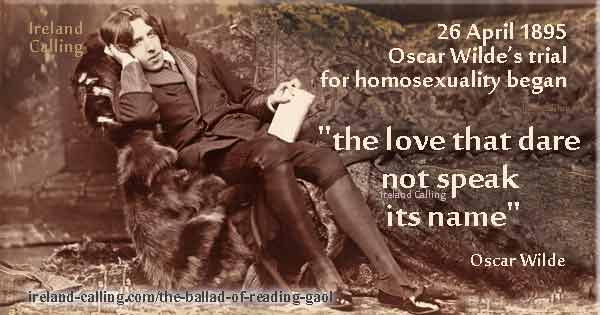
Here is a transcript from the trial, when Wilde was questioned about a phrase he used in a letter he sent to a younger man:
Charles Gill (prosecuting): What is “the love that dare not speak its name”?
Wilde: “The love that dare not speak its name” in this century is such a great affection of an elder for a younger man as there was between David and Jonathan, such as Plato made the very basis of his philosophy, and such as you find in the sonnets of Michelangelo and Shakespeare.
“It is that deep spiritual affection that is as pure as it is perfect. It dictates and pervades great works of art, like those of Shakespeare and Michelangelo, and those two letters of mine, such as they are. It is in this century misunderstood, so much misunderstood that it may be described as “the love that dare not speak its name,” and on that account of it I am placed where I am now.
“It is beautiful, it is fine, it is the noblest form of affection. There is nothing unnatural about it. It is intellectual, and it repeatedly exists between an older and a younger man, when the older man has intellect, and the younger man has all the joy, hope and glamour of life before him. That it should be so, the world does not understand. The world mocks at it, and sometimes puts one in the pillory for it.”
Click here or on the picture to go to the full poem, The Ballad of Reading Gaol.
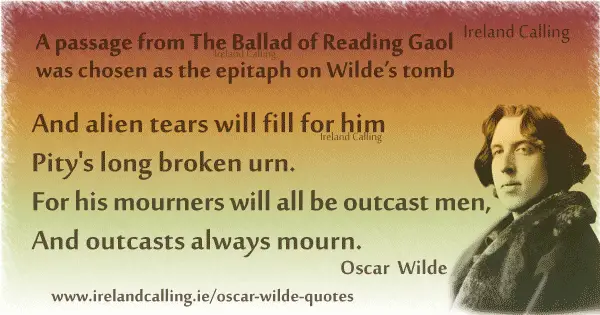
Wilde was sentenced to two years in prison, where his health deteriorated rapidly. While imprisoned he wrote the famous poem, The Ballad of Reading Gaol, which was voted one of Ireland’s 100 favourite poems in 1999. Wilde was released in 1897 but his health never recovered and he died in 1900.
Click here to read some of the best Oscar Wilde quotes
Click here to read the poem, The Ballad of Reading Gaol
Click here to read Ireland’s 100 favourite poems
Click here to read about more great Irish writers
* * *
1908 Today was the first day of the Belfast Lockout of 1908, when dock workers went on strike in protest of dangerous working conditions and low pay.
The city of Belfast was greatly divided. The skilled workers earned good wages and lived in relative luxury, while the unskilled workers lived in overcrowded communities where disease and hunger were rife, and worked long hours in dangerous conditions for little pay.
Of the unskilled workforce, most worked as labourers on the city’s docks. They had no union to protect their rights, and were themselves divided between Protestant and Catholics, with the Protestant being given the better and safer jobs.
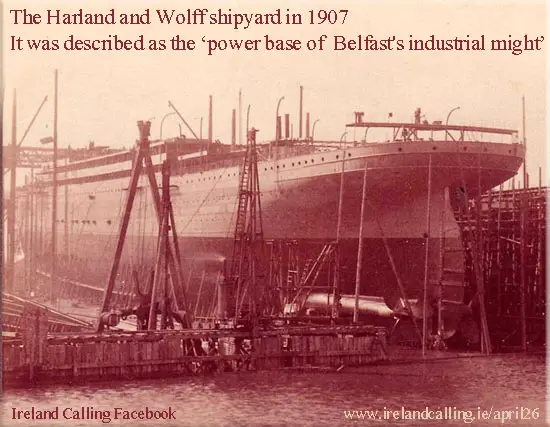
James Larkin, a Liverpool-born Irish Catholic travelled to Belfast. He went with the aim of gaining the support of the dockers for the recently formed National Union of Dock Labourers (NUDL).
Larkin was an outstanding speaker, and addressed the crowds of dockers on several occasions. He inspired them to believe that they could change their situation. Just because they had no money, they still had a voice and could be a powerful force if they united together.
Larkin was the man who coined the phrase, ‘A fair day’s work for a fair day’s pay’. However, possibly his most famous quote was made when addressing the Belfast dockers, making them believe that they could take on the wealthy factory owners:
“The great appear great because we are on our knees. Let us rise!”

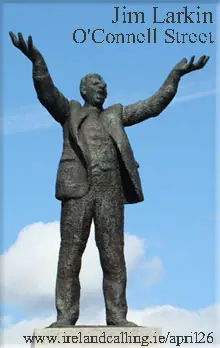 The workers did unite, and refused to work on this day in 1908. The strike spread throughout the city, with various groups of low paid workers downing tools at various stages over the next few months.
The workers did unite, and refused to work on this day in 1908. The strike spread throughout the city, with various groups of low paid workers downing tools at various stages over the next few months.
These strikes were at great cost to the factory owners as they had to ship in new workforces to continue productions, and also pay for their security under the threat of attack from the strikers.
The strikes continued for four months until the head of the NUDL ordered an end, as the payments being made to the strikers was threatening to bankrupt the Union.
However, the Belfast Lockout was seen as a moderate victory for the workers, with the Irish Transport & General Workers Union (ITGWU) established a short time later.
Click here to read more James Larkin quotes
Click here to read more inspirational Irish quotes
* * *
1916 Francis Skeffington, a famous Dublin pacifist, passionate about Irish rights and women’s rights, was shot dead. He was a writer and Irish nationalist who was murdered during the Easter Rising. He agreed with the rebels’ cause, but didn’t believe a violent uprising was the correct course of action.
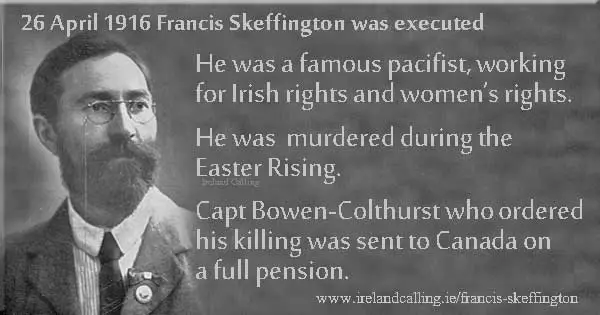 Read Francis Skeffington’s story here
Read Francis Skeffington’s story here
* * *
1916 The British government declared martial law in Ireland.
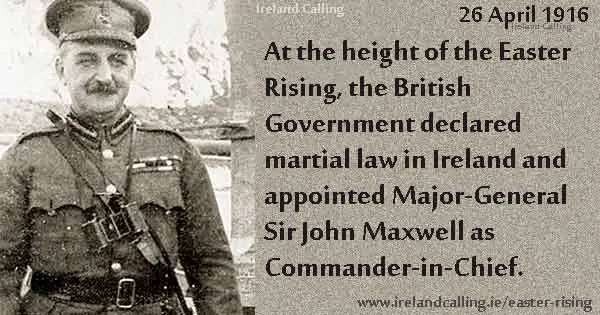
* * *
1916 Thousands of British soldiers arrived in Dublin on this day in 1916. They were ordered in as reinforcements by Brigadier-General William Lowe to quash the Irish rebels who had attempted to take control of the city.
The rebels had seized several major buildings across Dublin, but had failed to take control of the two train stations or the port. This enabled Lowe to bide his time before entering into conflict, and ship in heavy reinforcements to tackle the rebels.
He was unsure of the size of the army he was up against and this made him wary to enter battle before securing the necessary resources.
By the afternoon of 26th April 1916, the IRA rebels had an army of about 1,200 men, but faced a British military of 16,000 fully equipped trained soldiers. The fighting continued for the next few days.
Click here to read more about the Easter Rising
* * *
1932 Aengus Finucane was born in Limerick on this day in 1932. He was a priest and did great humanitarian work, particularly during the Nigerian Civil War in the 1970s. The Nigerian government had cut off food supplies to certain areas of the country, leaving millions of people starving.
This caused widespread appellation, and Finucane organised food drops from unrecognised airstrips, and his work led to the formation of the humanitarian group Concern Worldwide. Finucane continued his work to aid people in third world and war-torn countries, often travelling alongside Mother Teresa.
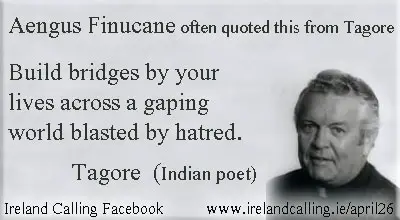
He died of cancer in 2009, and was described by the Minister for Overseas Development, Peter Power, as a “tireless force for good across the globe for more than four decades”.
* * *
2002 British Prime Minister Tony Blair received more than one million postcards on this day in 2002, as the Irish public continue their campaign to have the Sellafield nuclear processing plant closed down.

The factory sits on the west coast of England, facing the Irish Sea, and experts fear it could do long term damage to the country. High profile figures such as musician Ronan Keating and Manchester United star Roy Keane publicly stated their support for the campaign.
Click here to read about Ronan Keating’s collaboration album with Burt Bacharach
Click here to read about more Irish music stars
Click here to read more about Roy Keane and other top Irish sports stars
april-bottom.html